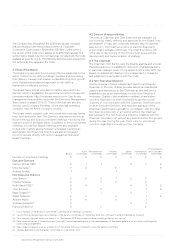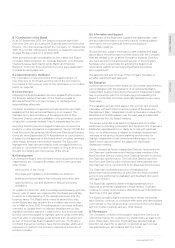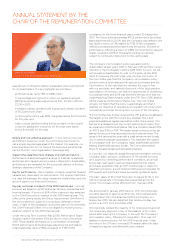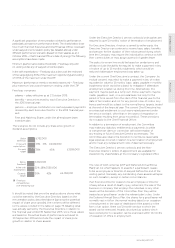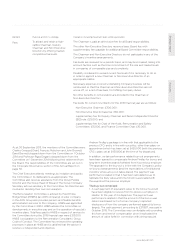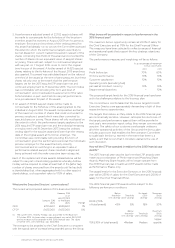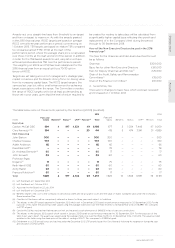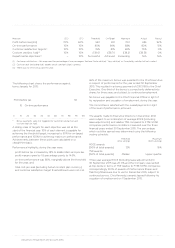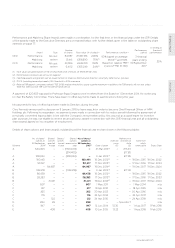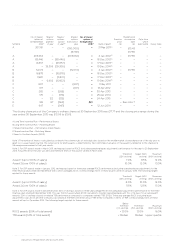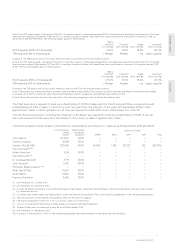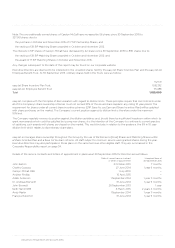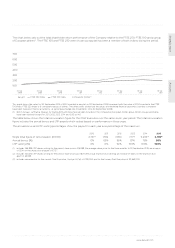EasyJet 2015 Annual Report Download - page 73
Download and view the complete annual report
Please find page 73 of the 2015 EasyJet annual report below. You can navigate through the pages in the report by either clicking on the pages listed below, or by using the keyword search tool below to find specific information within the annual report.
Strategic report Governance Accounts
69
www.easyJet.com
How much could the Executive Directors earn under the
remuneration policy?
A significant proportion of remuneration is linked to performance,
particularly at maximum performance levels. The charts below show
how much the Chief Executive and Chief Financial Officer could earn
under easyJet’s remuneration policy (as detailed above) under
different performance scenarios (based on their salaries as at 2
October 2015 – Chief Financial Officer’s date of joining). The following
assumptions have been made:
Minimum (performance below threshold) – Fixed pay only with
no vesting under any of easyJet’s incentive plans.
In line with expectations – Fixed pay plus a bonus at the mid-point
of the range (giving 50% of the maximum opportunity) and vesting
of 37.5% of the maximum under the LTIP.
Maximum (performance meets or exceeds maximum) – Fixed pay
plus maximum bonus and maximum vesting under the LTIP.
Fixed pay comprises:
• salaries – salary effective as at 2 October 2015;
• benefits – amount received by each Executive Director in
the 2015 financial year;
• pension – employer contributions or cash-equivalent payments
received by each Executive Director in the 2015 financial year;
and
• Free and Matching Shares under the all-employee share
incentive plan.
The scenarios do not include any share price growth or
dividend assumptions.
Below
threshold
£752,000
£2,106,000
£460,000
£1,150,000
£2,053,000
£3,896,000
In line with
expectations
Exceeds
target
Exceeds
target
Below
threshold
In line with
expectations
Fixed pay
Annual Bonus
LTIP (Performance)
100%
36%
19%
100%
40%
22%
32% 28%
36% 42%
33% 31%
45%36%
CHIEF FINANCIAL OFFICER
CHIEF EXECUTIVE
It should be noted that since the analysis above shows what
could be earned by the Executive Directors based on the
remuneration policy described above (ignoring the potential
impact of share price growth), the numbers will be different
to the values included in the table on page 73 detailing what
was actually earned by the Executive Directors in relation to
the financial year ended 30 September 2015, since these values
are based on the actual levels of performance achieved to
30 September 2015 and include the impact of share price
growth in relation to share awards.
What are the Executive Directors’ terms of employment?
Under the Executive Directors’ service contracts both parties are
required to give 12 months’ notice of termination of employment.
For Executive Directors, if notice is served by either party, the
Executive Director can continue to receive basic salary, benefits
and pension for the duration of their notice period during which
time the Company may require the individual to continue to fulfil
their current duties or may assign a period of garden leave.
The policy for a new hire would be based on similar terms and
will also include the ability for easyJet to make a payment in lieu
of notice of up to 12 monthly instalments which would be
reduced if alternative employment was taken up.
Under the current Chief Executive’s contract, the Company, by
mutual consent, may elect to make a payment in lieu of notice
equivalent in value to 12 months’ basic salary, payable in monthly
instalments which would be subject to mitigation if alternative
employment is taken up during this time. Alternatively, this
payment may be paid as a lump sum. Bonus payments may be
made, payable in cash, on a pro-rata basis, but only for the
period of time served from the start of the financial year to the
date of termination and not for any period in lieu of notice. Any
bonus paid would be subject to the normal bonus targets, tested
at the end of the financial year. The current Chief Executive has
a contractual entitlement to such a pro-rated payment under
her service contract, other than in the cases of resignation or
termination resulting from gross misconduct. These provisions
do not apply to the Chief Financial Officer.
In relation to a termination of employment, the Committee
may make any statutory entitlements or payments to settle
or compromise claims in connection with a termination of
any existing or future Executive Director as necessary. The
Committee also retains the discretion to reimburse reasonable
legal expenses incurred in relation to a termination of employment
and to meet any outplacement costs if deemed necessary.
The Executive Directors’ service contracts and the Non-
Executive Directors’ letters of appointment are available for
inspection by shareholders at the Company’s registered office.
What is the policy when an Executive Director leaves or there
is a takeover?
The rules of both schemes (LTIP and Deferred Annual Bonus
Plan) set out what happens to awards if a participant ceases
to be an employee or Director of easyJet before the end of the
vesting period. Generally, any outstanding share awards will lapse
on such cessation, except in certain circumstances.
If an Executive Director ceases to be an employee or Director
of easyJet as a result of death, injury, retirement, the sale of the
business or company that employs the individual, or any other
reason at the discretion of the Committee, then they will be
treated as a ‘good leaver’ under the relevant plan’s rules. Under
the Deferred Annual Bonus Plan, the shares for a good leaver will
normally vest in full on the normal vesting date (or on cessation
of employment in the case of death) and if the award is in the
form of an option, there is a 12-month window in which the
award can be exercised. Awards structured as options which
have vested prior to cessation can be exercised within 12 months
of cessation of office or employment.



